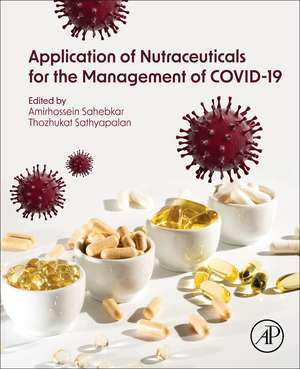Application of Nutraceuticals for the Management of COVID-19
Editat de Amirhossein Sahebkar, Thozhukat Sathyapalanen Limba Engleză Paperback – 14 sep 2024
- Provides evidence-based findings regarding the role of natural products in the treatment of Covid-19
- ?Elucidates future research areas in the therapeutic role and mechanisms of the effects of nutraceuticals in the treatment of Covid-19
- ?Aids in better decisions for the treatment of patients with Covid-19
Preț: 858.50 lei
Preț vechi: 1079.74 lei
-20% Nou
Puncte Express: 1288
Preț estimativ în valută:
164.33€ • 178.55$ • 138.12£
164.33€ • 178.55$ • 138.12£
Carte disponibilă
Livrare economică 24 martie-07 aprilie
Preluare comenzi: 021 569.72.76
Specificații
ISBN-13: 9780443220050
ISBN-10: 0443220050
Pagini: 200
Dimensiuni: 191 x 235 mm
Editura: ELSEVIER SCIENCE
ISBN-10: 0443220050
Pagini: 200
Dimensiuni: 191 x 235 mm
Editura: ELSEVIER SCIENCE
Cuprins
1. Antiviral mechanisms of curcumin in the prevention and treatment of COVID-19: A review
2. The role of cinnamon on COVID-19: state-of-the-art
3. Green tea: a comprehensive review with a focus on COVID-19 biomarkers
4. Ginseng and COVID-19: a comprehensive review with a focus on COVID-19 biomarkers
5. Saffron: a potential natural therapy against COVID-19
6. Effects of resveratrol against COVID-19: Current evidence and possible efficacy
7. Vitamin D and risk of COVID-19: a review of literature
8. Liquorice Extract and possible effects in overcoming SARS-CoV-2 infections
9. The Potential beneficial effects of Barberry against COVID-19
10. The Potential Effect of Nigella sativa on Biomarkers Related to COVID-19 Infection and Severe progression
11. The potential effect of quercetin on COVID-19 Infection and severe progression: a review of mechanisms and past studies
12. The potential effect of garlic on biomarkers related to COVID-19 Infection
13. The potential effect of nuts on biomarkers related to COVID-19 Infection and Severe progression
14. The potential effect of propolis on biomarkers related to COVID-19 infection and severe progression
15. The Role of Probiotics in Management of SARS-CoV-2 infections
16. The potential effects of L-Carnitine in management of complications and severity of SARS-CoV-2 infection
17. Zinc and COVID-19 infection
18. The potential effect of selenium on biomarkers related to COVID-19 Infection
19. Vitamin C and COVID-19: is there a link?
20. The Potential Role of Omega-3 Fats in Treatment of Patients with SARS-CoV-2
22. Effects of coQ10 against COVID-19: Current evidence and possible efficacy
2. The role of cinnamon on COVID-19: state-of-the-art
3. Green tea: a comprehensive review with a focus on COVID-19 biomarkers
4. Ginseng and COVID-19: a comprehensive review with a focus on COVID-19 biomarkers
5. Saffron: a potential natural therapy against COVID-19
6. Effects of resveratrol against COVID-19: Current evidence and possible efficacy
7. Vitamin D and risk of COVID-19: a review of literature
8. Liquorice Extract and possible effects in overcoming SARS-CoV-2 infections
9. The Potential beneficial effects of Barberry against COVID-19
10. The Potential Effect of Nigella sativa on Biomarkers Related to COVID-19 Infection and Severe progression
11. The potential effect of quercetin on COVID-19 Infection and severe progression: a review of mechanisms and past studies
12. The potential effect of garlic on biomarkers related to COVID-19 Infection
13. The potential effect of nuts on biomarkers related to COVID-19 Infection and Severe progression
14. The potential effect of propolis on biomarkers related to COVID-19 infection and severe progression
15. The Role of Probiotics in Management of SARS-CoV-2 infections
16. The potential effects of L-Carnitine in management of complications and severity of SARS-CoV-2 infection
17. Zinc and COVID-19 infection
18. The potential effect of selenium on biomarkers related to COVID-19 Infection
19. Vitamin C and COVID-19: is there a link?
20. The Potential Role of Omega-3 Fats in Treatment of Patients with SARS-CoV-2
22. Effects of coQ10 against COVID-19: Current evidence and possible efficacy
